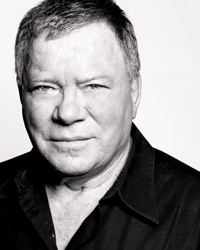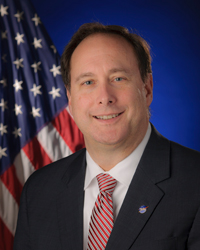2018 PRESS/PHOTO INFORMATION
Press Release
RNASA's 2018 Stellar Awards Winners Announced
Rotary National Award for Space Achievement
May 8, 2018
Media Contact: Lindsey Cousins, 281-723-5683, lindsey@baysidegraphics.net
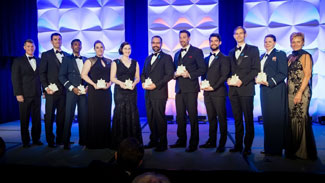
2018 Early Career Stellar Awardees, L to R: Shane Kimbrough (presenting), Leslie K. Padilla, Michael V. Nayak, Jennifer E. Matty, Elishabet Lato, Anton P. Kiriwas, Sam T. Hablitzel, Ian Fischer, John H. Burke, Alessa Makuch, Peggy Whitson (presenting), Daniel Rodgers (not pictured)
See full size.
(RNASA Photo, 2018)
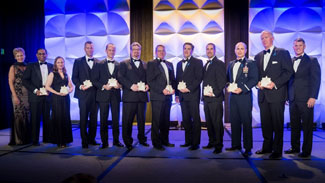
2018 Mid Career Stellar Awardees, L to R: Peggy Whitson (presenting), Satish C. Reddy, Laura M. Lucier, William E. Green, Justin McFatter, Rocky E. Nelson, Mark W. Hilburger, Jerry Draper, Trevor M. DeVault, Robert M. Atkins, Lawrence M. Robertson, Shane Kimbrough (presenting)
See full size.
(RNASA Photo, 2018)
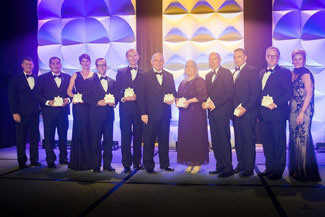
2018 Late Career Stellar Awardees, L to R: Shane Kimbrough (presenting), Frank Salazar, Susan B. Rainwater, Terry L. McGee, Curtis Johnson, Daryl Ethington, Susan L. Crippen, Wesley R. Bruner, Lee J. Archambault, David M. Wilt, Peggy Whitson (presenting)
See full size.
(RNASA Photo, 2018)
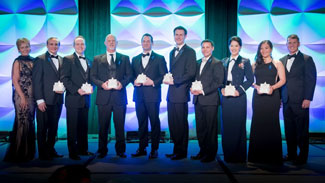
2018 Stellar Team Awardees, L to R: Peggy Whitson (presenting), Gary Ruff (Saffire Project Team), Sean OĠDell (Orion Spacecraft Test and Qualification Team), Greg Byrd (RS-25 Assembly Team), Jeremy Banik (Roll-Out Solar Array Team), Blake Watters (Orion Launch Orbit Abort System Propulsion Team), Kenneth Anderle (James Webb Space Telescope Test Team), Latasha Spear (Architecture and Plans Branch), Jessica Chang (Autonomous Flight Termination System Team), Shane Kimbrough (presenting)
See full size.
(RNASA Photo, 2018)
Every year, the aerospace community anxiously awaits the announcement of the Rotary National Award for Space Achievement (RNASA) Stellar Award winners. Out of 175 nominations received, the panel selected 29 individuals and 9 teams for recognition.
The 2018 Stellar Awards Evaluation Panel, Glynn Lunney, Arnold Aldrich, Eileen Collins, Michael Coats, and Kevin Chilton selected the winners based on which accomplishments have advanced U.S. space capabilities and hold the greatest promise of future capabilities.
Prior to the evening's festivities, all nominees were treated to a behind-the-scenes tour of the Johnson Space Center and a luncheon at the Lakewood Yacht Club. Stellar Awards Committee Chair Jennifer Devolites welcomed the nominees, as did RNASA Chairman Rodolfo González, and former Space Center Rotary President and current RNASA director John Branch.
Randy Bresnik was the featured speaker at the Stellar Awards Luncheon. Selected for the astronaut program in 2004, Bresnik is a veteran of STS-129 and has trained as an Aquanaut for NASA's Extreme Environment Mission Operation and a Cave-a-naut with the European Space Agency. Bresnik most recently served as the Commander of the ISS for Expedition 53 and the flight engineer for Expedition 52.
Each nominee received a Fisher Space Pen donated by the company. The Fisher Space Pen was originally carried by the astronauts of the Apollo moon missions and is still used on manned space flights to this day. They are precision assembled, hand tested, and guaranteed to perform underwater, at any angle including upside down, in extreme temperatures, and of course in zero gravity.
All the Stellar nominees had their photo taken as they received a special commemorative certificate with a United States flag that was flown aboard the Space Shuttle Endeavour, STS-108, December 5 17, 2001.
The Stellar Award winners were announced at the RNASA evening gala on April 27, 2018 by Astronauts Peggy Whitson and Shane Kimbrough who presented them with engraved marble trophies donated by Orbital ATK. The winners in each of the four categories, Early Career, Mid Career, Late Career and Team are:
2018 Stellar Award Winners in the Early Career Category
John H. Burke of the USAF AFRL - Outstanding contributions to developing new capabilities that significantly enhance navigation performance, both with and without the Global Positioning System (GPS).
Ian Fischer of SpaceX - Exceptional leadership of the Merlin engine flight operations and recovery program, including the first orbital rocket reflight.
Sam T. Hablitzel of Aerojet Rocketdyne - Outstanding leadership, proven technical achievements and exemplary performance, helping to pave the way for space exploration.
Anton P. Kiriwas of NASA Kennedy Space Center - Outstanding EGS Ground & Flight Software Applications technical integration and exemplary leadership, contributing to the success of the United States' Deep Space Exploration mission.
Elishabet Lato of Orbital ATK - Outstanding leadership of the Orion ACM energetics development and qualification, and community service through AIAA leadership and STEM activities.
Alessa Makuch of the USAF - Outstanding technical leadership to resolve multiple launch vehicle anomalies and successfully launching national security space-priority payloads in support of warfighters across the globe.
Jennifer E. Matty of UTC Aerospace Systems - Exceptional technical skills and leadership in product safety and reliability engineering to support NASA space exploration.
Michael V. Nayak of the USAF AFRL - Exceptional technical accomplishments as a researcher and military officer, including development of a new dynamical method to analyze planetary surfaces across the solar system, and an order of magnitude drop in warning time for hostile space actions using an automated four-telescope system.
Leslie K. Padilla of The Aerospace Corporation - Outstanding leadership in the resolution of issues critical to the performance of Extravehicular Activity on the International Space Station.
Daniel Rodgers of Orbital ATK - Outstanding radio frequency engineering contributions to the Cygnus CRS Program for enhancements of the on-board communication system.
2018 Stellar Award Winners in the Mid-Career Category
Robert M. Atkins of the USAF - Visionary leadership in creating the first-ever launch multi-manifest office and establishing the Space Innovation Academy to educate young students about space.
Trevor M. DeVault of The Boeing Co. - Outstanding effort leading the development of a third International Docking Adapter for ISS.
Jerry Draper of Lockheed Martin - Outstanding technical achievement in inventing the new Orion heat shield block architecture and upgrading the re-entry design for Lunar and Mars mission returns.
Mark W. Hilburger of NASA Langley Research Center - Outstanding technical efforts in the development of a comprehensive plan to improve shell buckling knockdown factors.
William E. Green of Orbital ATK - Outstanding leadership, technical excellence and dedication to the Orion Launch Abort Attitude Control Motor Controls team success.
Justin McFatter of The Boeing Co. - Outstanding leadership and outstanding support of the NASA Docking Systems Project.
Laura M. Lucier of NASA Johnson Space Center - Outstanding contributions to operations and robotics for human spaceflight, contributing to the successes of the Space Shuttle and International Space Station programs.
Rocky E. Nelson of The Boeing Co. - Outstanding contributions and dedication to ensure the Exploration Upper Stage (EUS) thermal design surpasses expectations
Satish C. Reddy of Jacobs - Outstanding innovations, leadership and contributions to structural analysis and human spaceflight.
Lawrence M. Robertson of the USAF AFRL - Exceptional contributions to developing new capabilities that significantly enhance navigation performance of guidance, navigation and control.
2018 Stellar Award Winners in the Late Career Category
Lee J. Archambault of Sierra Nevada Corporation - Outstanding leadership of the highly successful Dream Chaser Approach And Landing Test #2 (ALT-2) at Edwards Air Force Base in November 2017.
Wesley R. Bruner of The Boeing Co. - Successful founding and leadership of the Boeing Houston Dynamics and Controls team responsible for integrated control system and structural dynamics analysis for the ISS Program.
Susan L. Crippen of Stinger Ghaffarian Technologies, Inc. (SGT) - Sustained GN&C instructional excellence for a generation of astronauts and flight controllers providing lasting impact to NASA's success.
Daryl Ethington of Jacobs - Outstanding dedication and technical expertise in setting standards for manned testing for human spaceflight.
Curtis Johnson of Blue Origin - Outstanding leadership of primary propulsion development at Blue Origin as it grew from a small team to a major innovator in the global aerospace industry.
Terry L. McGee of The Boeing Co. - Exemplary leadership and meritorious expertise in dynamic analysis, mechanical design and manufacturing, with many notable contributions to designs which increase efficiency and first-time quality during manufacturing, testing, and launch operation phases.
Susan B. Rainwater of NASA Johnson Space Center - Outstanding leadership in flight operations that contributed to the successes of the Space Shuttle, Hubble Space Telescope, and International Space Station Programs.
Frank Salazar of CACI - Significant engineering knowledge and expertise contributing to the design of numerous human spaceflight pyrotechnic hardware systems, including multiple parachute elements of the Orion Multi-Purpose Crew Vehicle Program.
David M. Wilt of the USAF AFRL - Outstanding contributions to developing new capabilities that significantly enhance spacecraft power research and technologies.
Stellar Award Winners - Team
Architecture and Plans Branch of the USAF - Exemplary initiative and analytical rigor to influence major pathfinders and advances in the protection of National Security Space capabilities.
Autonomous Flight Termination System Team of SpaceX - Outstanding technical leadership of the Autonomous Flight Safety System development program.
James Webb Space Telescope Test Team of Jacobs - Exceptional contributions to space exploration with the successful completion of the James Webb Space Telescope cryo-vacuum test program at the NASA Johnson Space Center.
Orion Launch Abort System Propulsion Team of Lockheed Martin - Outstanding accomplishment in successfully completing two high-visibility hot fire tests to validate solid rocket motor designs for NASA's Orion Launch Abort System.
Orion Spacecraft Test and Qualification Team of Lockheed Martin - Outstanding execution of the Orion spacecraft test program in support of NASA's Exploration Missions EM-1, EM-2 and beyond.
Roll-Out Solar Array (ROSA) Team of the USAF AFRL - Outstanding team contributions to developing new solar array capabilities, significantly reducing mass and cost.
RS-25 Assembly Team of Aerojet Rocketdyne - Exceptional service to human spaceflight with the early delivery of Exploration Mission 1 flight engines.
Saffire Project Team of NASA Glenn Research Center - Innovative contributions using new approaches in the successful design, build and operation of Saffire I/II/III and achieving complete mission success.
Visit http://www.rnasa.org/photos.html for images from the event. The Rotary National Award for Space Achievement (RNASA) Foundation's black-tie Gala on April 27, 2018, was recorded live, in its entirety, by Space City Films and will be accessible on the website's agenda page, www.rnasa.org/agenda.html.
About RNASA: The Rotary National Award for Space Achievement (RNASA) Foundation was founded by the Space Center Rotary Club of Houston, Texas in 1985 to organize and coordinate an annual event to recognize outstanding achievements in space and create greater public awareness of the benefits of space exploration. The nonprofit Foundation presents the National Space Trophy and Stellar Awards each year. See http://www.rnasa.org for more information
Read the press release as a Word document.
Press Release
RNASA Foundation Honors Robert Lightfoot, William Shatner, and Stellar Winners
Rotary National Award for Space Achievement
May 7, 2018
Media Contact: Lindsey Cousins, 281-723-5683, lindsey@baysidegraphics.net
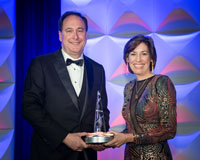
JSC Director Ellen Ochoa presents the National Space Trophy to former NASA Acting Administrator Robert Lightfoot
See full size.
(RNASA Photo, 2018)
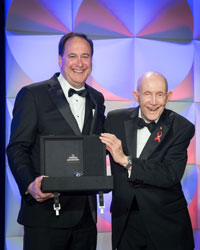
Lt. Gen. Thomas Stafford presents the OMEGA speedmaster watch to Robert Lightfoot
See full size.
(RNASA Photo, 2018)
RNASA Foundation Chairman Rodolfo González welcomed the guests to gala, saying that "RNASA's mission is to encourage, recognize, honor and celebrate U.S. space achievements from across the entire country and across all sectors."
The Clear Brook High School JROTC Color Guard presented the colors, followed by Thomas Glass, first year baritone from Houston Grand Opera, who sang the National Anthem a cappella. Reverend Michael Stone, St. Thomas the Apostle Episcopal Church, gave the invocation.
After dinner, the program kicked off with a year-in-review film by Space City Films. John Zarrella, former CNN correspondent served as the emcee. John said "we are here tonight in no small part to acknowledge the accomplishments of men and women behind the scenes. Tonight, we will honor many individuals who have made outstanding contributions to our space program."
Cindy Steele, NASA Public and Stakeholder Engagement Division Chief, presented the 2018 Space Communicator Award to William Shatner, best known for his role as Captain James Kirk of Star Trek's USS Enterprise, saying that "as a lifelong advocate of science and exploration, Mr. Shatner has inspired generations of young explorers." Mr. Shatner accepted the honor via video, saying "the concept of space travel and exploration is one of great mysteries we humans can ponder. Space is the greatest mystery story of all."
Stellar Awards were presented to 29 individuals and 8 teams. The Stellar Award winners were announced by NASA Astronauts Shane Kimbrough, and Peggy Whitson, who then presented them with engraved marble trophies donated by Orbital ATK. The Stellar Awards were presented in Early Career, Mid-Career, Late Career, and Team categories.
NASA Astronauts Scott Tingle, Drew Feustel, and Ricky Arnold, sent a congratulatory message down from the International Space Station to Lightfoot on receiving the National Space Trophy, telling him "we wouldn't be on this amazing laboratory in space today if it hadn't been for your complete dedication to our mission and for your effectiveness in the many roles you held over your career. Our community thrives because of your commitment to safety and mission success. Robert, congratulations on this prestigious and well-deserved honor."
Ellen Ochoa, Director of the Johnson Space Center, presented the prestigious 2018 National Space Trophy to Robert Lightfoot. In her introductory comments, Ochoa said "The many leadership roles that Robert Lightfoot has held and excelled at over his entire aerospace career made him the ideal person to lead NASA during the last 15 months." While accepting the NST, Lightfoot said, "...I really feel like I've been honored with the pinnacle of recognition in our business. This is the biggest award you could bestow on me, but really it is for this entire team and what we do. What we do every day makes a difference."
Lt. Gen Thomas P. Stafford, USAF (Ret.), Gemini and Apollo astronaut, and the 1993 National Space Trophy winner, presented an OMEGA speedmaster watch to Lightfoot, saying "The National Space Trophy is very well deserved. I followed you your whole career, it has been superb."
Engility donated the portrait of Lightfoot by Pat Rawlings, which was on display at the gala and used as the cover of the souvenir program. The portrait will become part of the National Space Trophy display at Space Center Houston for one year.
RNASA Chairman Rodolfo González concluded the evening by thanking the Foundation's corporate sponsors whose support and achievements made the event possible: a.i.solutions, Inc., Aerie Aerospace, Aerojet Rocketdyne, The Aerospace Corp , ARES Corporation, ASRC Federal, Barrios Technology, Bastion Technologies, Inc., Blue Origin, The Boeing Company, Booz Allen Hamilton, CACI International, Draper Laboratory, Dynetics, Engility, ERC, Inc., GeoControl System, Inc., Honeywell, Jacobs, KBRwyle, Leidos, Lockheed Martin, MEI Technologies, Inc., MORI Associates, Inc., MRI Technologies , Oceaneering International, Inc., Orbital ATK, Raytheon, SAIC, SGT, Inc., Sierra Nevada Corporation, SpaceX, University of Houston-Clear Lake, UTC Aerospace Systems, and Vericon Technical Services.
Visit http://www.rnasa.org/photos.html for images from the event.
The Rotary National Award for Space Achievement (RNASA) Foundation's black tie Gala on April 27, 2018, was recorded live, in its entirety, by Space City Films and will be accessible on the website's agenda page, www.rnasa.org/agenda.html.
About RNASA: The Rotary National Award for Space Achievement (RNASA) Foundation was founded by the Space Center Rotary Club of Houston, Texas in 1985 to organize and coordinate an annual event to recognize outstanding achievements in space and create greater public awareness of the benefits of space exploration. The nonprofit Foundation presents the National Space Trophy and Stellar Awards each year.
Read the press release as a Word document.
Press Release
William Shatner to receive RNASA's 2018 Space Communicator Award
Rotary National Award for Space Achievement
February 20, 2018
Media Contact: Lindsey Cousins, 281-723-5683, lindsey@baysidegraphics.net
Long known for his role as Captain James Kirk of Star Trek's USS Enterprise, Shatner has inspired generations of young explorers. His role as Captain Kirk spanned nearly three decades, first on the 1960's NBC television series and, later, in seven feature films between 1979-1994. Bob Jacobs, NASA Deputy Associate Administrator for Communications, who nominated Shatner said, "Many past, present, and future NASA astronauts, engineers and scientists admit their inspiration for pursuing their particular careers was because of the adventures over the past five decades of Capt. James T. Kirk and the crew of the starship U.S.S. Enterprise."
Shatner has long been an advocate of international space exploration efforts. In recent years, he has supported numerous NASA outreach activities to educate the public and to inspire a new generation of explorers.
Shatner said of his award, "I am honored for RNASA to select me as the recipient of the 2018 Space Communicator Award. As a lifelong fan of space exploration, I'm pleased I've been able to contribute to the public's greater understanding and appreciation of space."
In 2011, Shatner donated his time in honor of Space Shuttle Discovery's final flight. He recreated the famous Star Trek introduction for the crew of STS-133 saying, "These have been the voyages of the space shuttle Discovery. Her 30-year mission: to seek out new science, to build new outposts, to bring nations together in the final frontier, to boldly go and do what no spacecraft has done before." He also narrated the space shuttle 30 th anniversary documentary.
In 2012, Shatner narrated the Grand Entrance to Mars presentation which guided viewers through Curiosity's complex landing on the Martian surface. In order to make a successful soft landing, the Curiosity spacecraft had seven minutes to slow down from 13,000 mph as it rocketed through the atmosphere. It was appropriately dubbed the "seven minutes of terror".
He continued his support in the fall of 2017 by sending a message to the Voyager spacecraft on its 40th anniversary. It read "We offer friendship across the stars. You are not alone." Launched in 1977, the Voyager probe is beaming back data from the furthest reaches of our solar system. As of January 2018, Voyager was 13 billion miles from Earth.
Shatner was born in 1931 in Montreal, Quebec, Canada. He graduated from McGill University in 1952 with a Bachelor of Commerce degree. His career began in 1954 where he performed at the Stratford Shakespeare Festival in Stratford, Ontario in productions such as Sophocles' Oedipus Rex and Henry V. Shatner has three daughters and lives in Southern California with his wife, Elizabeth. He owns a 360-acre farm in Kentucky where he breeds American Saddlebred horses. In 1994, he rode one of his horses as the Grand Marshal of the Tournament of Roses Parade in California.
The RNASA Space Communicator Award was created in 1997 in honor of KTRK, Houston Channel 13 space reporter and long-time RNASA Advisor Stephen Gauvain who was tragically killed in a car accident in 1996. The award is presented to an individual or team that makes exceptional contributions to public understanding and appreciation of space exploration The previous recipients of the award are: William Harwood of CBS; Miles O'Brien, formerly of CNN; Elliot Pulham of the Space Foundation; the NASA-Contractor Communications team that responded to the Columbia accident; Mark Carreau, formerly of the Houston Chronicle; Neil deGrasse Tyson of the Hayden Planetarium at the American Museum of Natural History in New York City, Veronica McGregor, Manager of News and Social Media at NASA's Jet Propulsion Laboratory in Pasadena, California; former Canadian Space Agency astronaut, author, and musician Chris A. Hadfield; Bill Nye (the science guy) CEO of the Planetary Society, and Rob Navias of NASA's Johnson Space Center.
Shatner will be honored with the 2018 Space Communicator Award at RNASA's 32nd annual National Space Trophy Banquet on April 27, 2018, at the Houston Hyatt Regency. Mr. Robert Lightfoot, NASA's Acting Administrator, will receive the 2018 National Space Trophy.
The RNASA Foundation invites members of the public and the aerospace community to attend the black-tie event on April 27, 2018, at the Houston Hyatt Regency. Please visit http://www.rnasa.org/tables.html to reserve your table for the RNASA Banquet and find information about sponsorships and tickets. To reserve a room at the Houston Hyatt Regency, please visit http://www.rnasa.org/houston.html or call 713-654- 1234 and request the RNASA group rate. The RNASA website is http://www.rnasa.org/.
About RNASA: The Rotary National Award for Space Achievement (RNASA) Foundation was founded by the Space Center Rotary Club of Houston, Texas, in 1985 to organize and coordinate an annual event to recognize outstanding achievements in space and create greater public awareness of the benefits of space exploration. The nonprofit Foundation presents the National Space Trophy and Stellar Awards each year.
Read the press release as a Word document.
Press Release
Mr. Robert Lightfoot, Acting NASA Administrator, to receive the 2018 National Space Trophy
Rotary National Award for Space Achievement
January 8, 2018
Media Contact: Lindsey Cousins, 281-723-5683, lindsey@baysidegraphics.net
Rodolfo González, President of the RNASA Foundation said, "We are excited about the Board of Advisors pick for the 2018 National Space Trophy and the Foundation looks forward to recognizing Mr. Lightfoot as the guest of honor at the RNASA Space Award Gala."
Mr. Lightfoot was nominated for the award by Dr. Ellen Ochoa, Johnson Space Center Director, Mr. Robert Cabana, Kennedy Space Center Director and Mr. Todd May, Marshall Space Flight Center Director. The nominators selected Lightfoot for his, "continued extraordinary accomplishments towards achieving NASA's vision and mission, sustaining America's leadership in space, and pushing the frontiers of science, discovery, and exploration."
Lightfoot said, "I am truly humbled and honored to receive the prestigious RNASA National Space Trophy. I feel very fortunate to be part of NASA and consider this honor a reflection of the incredible achievements and mission successes of our NASA team."
Mr. Lightfoot earned a bachelor's degree in mechanical engineering from the University of Alabama in 1986. His career with NASA began in 1989 at the Marshall Space Flight Center where he started as a test engineer and program manager. In 1999 he joined the Stennis Space Center in Mississippi where he was later named Propulsion Test Director in 2002.
In 2003, following the Columbia accident, Lightfoot's proven track record led him to Washington, DC where he was named Assistant Associate Administrator for the Space Shuttle Program. In this role, he led the return to flight efforts. It was in 2004 that President Bush unveiled a new Vision for Space Exploration. The new direction called for the retirement of the Space Shuttle Program, development of a new exploration vehicle and the completion of the ISS. Mr. Lightfoot led the charge as the first Shuttle Transition Manager.
Lightfoot transitioned back to Marshall in 2005 as Manager of the Space Shuttle Propulsion Office where he oversaw the manufacture, readiness, and launch of the space shuttle propulsion elements for four space shuttle missions. In 2007 he transitioned, first as Deputy Director and in 2009 to MSFC Center Director, where he managed a $2.6 billion budget, over 30,000 civil service and contractors and nearly 7 million square feet of facilities including the Michoud Assembly Facility in New Orleans. Michoud is one of the world's largest manufacturing sites and is the critical assembly center for NASA's exploration vehicles.
In 2012, Mr. Lightfoot accepted the position as NASA's Associate Administrator, the agency's highest ranking civil servant position, responsible for the day to day operations of the Agency's aeronautics, science, technology, and human spaceflight efforts.
Mr. Lightfoot became NASA's Acting Administrator in January of 2017 and is now the longest serving Acting Administrator in NASA's history. He has gained significant White House engagement for the importance of a strong space program. This has included an ISS downlink in the Oval Office with the President, visits to three NASA Centers by the Vice President, including JSC for the new Astronaut Candidate Class announcement, and the signing of the NASA Transition Authorization Act of 2017. Passed unanimously by Congress, the act authorizes the development of a long-range plan for deep space human exploration, endorses NASA's efforts to nurture a commercial market and guarantees improved health care for astronauts. 2018 marks NASA's 60th anniversary.
Looking toward the future, Lightfoot remarks "working with commercial partners, NASA will fly astronauts from American soil to the ISS on the first new crew transportation systems in a generation in the next couple of years. We are continuing the development of solar electric propulsion for use on future human and robotic missions. NASA is building a sustainable human spaceflight program to take humans to the Moon and beyond. We continue to make great progress toward these and many other major milestones as part of the diverse portfolio of work we execute as we explore, discover, and develop on behalf of the American people."
The RNASA Foundation invites members of the public and the aerospace community to attend the black-tie event on April 27, 2018, at the Houston Hyatt Regency, where Mr. Lightfoot will be recognized with the National Space Trophy. This year will be RNASA's 32nd annual National Space Trophy Banquet. Please visit http://www.rnasa.org/tables.html to reserve your table for the RNASA Banquet and find information about sponsorships and tickets. To reserve a room at the Houston Hyatt Regency, please visit http://www.rnasa.org/houston.html or call 713-654-1234 and request the RNASA group rate.
About RNASA: The Rotary National Award for Space Achievement (RNASA) Foundation was founded by the Space Center Rotary Club of Houston, Texas, in 1985 to organize and coordinate an annual event to recognize outstanding achievements in space and create greater public awareness of the benefits of space exploration. The nonprofit Foundation presents the National Space Trophy and Stellar Awards each year. The RNASA website is http://www.rnasa.org/.
Read the press release as a Word document.

